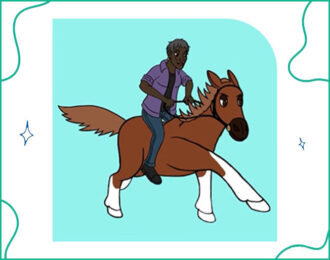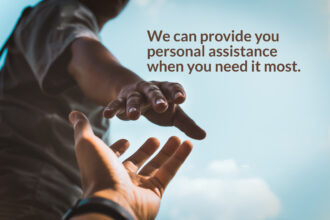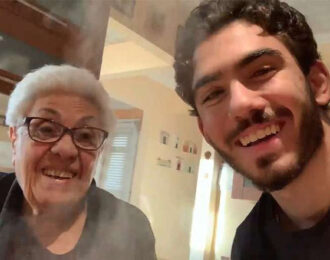What parents can say when death or tragedy hits home, according to expert

Article by Cassie Morris for yahoo, March 17, 2022, Updated March 19, 2022
While most people would agree that childhood should be a time of carefree innocence, one that should be protected from the burdens of adulthood, heavy experiences can be unavoidable for kids.
After all, death and dying are a part of life, and eventually, we all must have our first encounter with these abstract concepts and the difficult feelings they may bring.
Whether death and tragedy are witnessed on TV, overheard in adults’ conversations, or experienced firsthand in the death of a loved one, these harsh experiences are likely to raise many questions and emotions in kids.
We spoke with two mental health experts to learn how and when parents should discuss tragedy and loss with children so that kids can learn to process these experiences in a healthy way.
At what age should parents talk to their kids about tragedy, death or what they might see in the news?
“Developmentally, children typically don’t begin to have an understanding of the concept of death until around the ages of 4 to 6 and don’t go on to understand the permanency of death until around the ages of 7 to 11,” Andrea Dorn, psychotherapist and author of When Someone Dies: A Children’s Mindful How-To Guide on Grief and Loss, told In The Know by Yahoo.
“Despite this, there are ways we can introduce children to concepts like death and loss as young as 2 to 3 years old. And many experts agree it can be helpful to normalize these concepts early on and before kids are exposed to a more significant loss (if possible),” Dorn continued.
In fact, according to child psychologist Jasmin Searcy-Pate, it’s at this young age that kids first begin to develop empathy for other people’s feelings.
“Research has shown that around 2 years of age, children start to develop an emotion vocabulary, show genuine empathy [and] understand how other people feel even when they don’t feel the same way themselves,” Searcy-Pate told In The Know.
“From a grief and tragedy standpoint, not only can they experience another person’s pain, but they may try to soothe it and have big questions. Making death and/or tragedy a part of normal conversations is vital for children of all ages (even as young as 3) and can lay the groundwork for future conversations,” Searcy-Pate continued.
However, although we can introduce our children to the idea of death and dying early on, Dorn says it may be helpful to wait until kids are older and better equipped to handle such heavy conversations.
“While we can introduce our children to the idea of death and dying early on, when it comes to indirect proximity to tragedy or loss on the news or in the media, it may be helpful to wait to talk about these issues until they are school-aged and more equipped to understand these conversations,” said Dorn.
What if kids ask questions about death or tragedy before the recommended age for such conversations?
As we (sadly) know all too well, “the best laid plans of mice and men often go awry.”
So, while parents may have every intention of waiting until kids are school-age to discuss death or dying, an unexpected event — whether close to home or across an ocean — may inspire kids to start asking questions sooner than we’d like.
“Regardless of age, children have an innate ability to sense when something is not right and may ask questions about what is happening,” explained Dorn. “In this case, it is always OK to answer their questions honestly and openly. If you don’t know the answer, you can be open about that too.”
According to Searcy-Pate, if small children start asking questions about death or dying, parents should avoid complex language and should share information in small doses.
Parents and caregivers “can determine what the child can handle by providing information in small bits at a time and asking questions such as, ‘What do you know about Grandma dying?’ Caregivers will know what more to do based on the questions their child asks,” explained Searcy-Pate.
Be sure to explain the situation in an age-appropriate way and avoid giving too many details that could overwhelm them or providing more information than they actually asked for.
How should parents discuss death, dying or tragedy with their kids?
No matter our age, death can be an emotional topic and a difficult concept to grasp. That’s why, prior to broaching the topic with kids, it’s important for parents to have a game plan and be in the right headspace.
“I first encourage parents and caregivers to pause, reflect and center themselves before going into a conversation about tragedy or loss of any kind,” Dorn explained. “It is helpful to be present with your emotions and really get a handle on what you’d like to say.”
Once parents are feeling grounded, they can then plan for the conversation. Searcy-Pate recommends following her “TIPS” model:
“Talk about things slowly, proceeding in a gradual manner: Children take in information in bits and pieces over time. It’s best not to overwhelm them with information at once and expect them to take it all in.
Example: ‘Grandma was very sick. Her heart stopped beating and the doctors tried to help her, but they couldn’t, and she died.’
Identify your emotions, and then proceed: Showing your emotions is vital as caregivers and explaining the feelings that underlie those emotions can help prepare children for future moments when you may again feel overwhelmed by grief and become tearful during conversations.
In the event of a death: ‘Although I am sad, we can all be very happy that we had a chance to be with Grandma and spend time with her.’
In the event of a tragedy: ‘A person used their gun to shoot people. A lot of people were hurt and died. I feel sad that this happened.’
Promote safety: As caregivers, our roles are to protect our children, and they are looking for us to do so.
Example: ‘You are loved and safe. It’s a tough time right now for our family, but we have things to look forward to.’
Support your child and maintain structure: When death or tragedy occur, we are often thrown off our daily routines. As caregivers, it would be extremely important to maintain consistency and structure despite challenging times. Most importantly, caregivers should tune in to opportunities to offer extra affection and attention. They are the expert of knowing how to soothe their child.”
Dorn also adds that, in the event of a tragedy, parents can turn the conversation into a teachable moment of compassion by “pointing out the helpers.”
“There are always helpers or heroes when we look for them. Point out and honor those that may have been part of the tragedy or loss,” explained Dorn. “This is an opportunity to talk about how we can use kindness and compassion to heal and to build a world we all feel good about.”
At the end of the conversation, be sure to leave the door open for any questions your kids may have, either immediately or down the road. Later, check in with your kids to see how they’re feeling after your talk.
What are the signs and symptoms of a child being affected by death or loss?
A child doesn’t have to be brimming with questions to indicate that they’ve been impacted by tragedy or death.
“Responses to loss and tragedy are just as vast as the tragedies themselves,” explained Dorn. “Some children become very anxious and curious, others very sad and introspective. … You know your child best. If anything seems out of the ordinary, trust your parental instincts.”
According to Searcy-Pate, parents and caregivers should look out for these emotional and physical warning signs:
- Recurrent fears about safety for oneself, caregivers or others
- Clinginess
- Decreased concentration
- Frequent dreams or nightmares about death or tragedy
- Lack of interest in former activities
- Complaints of headaches, stomachaches, or other physical symptoms with no known medical explanation
- Increased behavior problems (e.g., tantrums)
- Changes in mood (e.g., irritability, anger)
- Decline in school performance
If you notice your kids exhibiting such symptoms for more than three weeks, Searcy-Pate says, it’s important to reach out to a licensed mental health professional for support.
What resources are available to parents for helping kids grieve?
For parents looking for extra support in helping their kids deal with tragedy or loss, there are a multitude of online and in-person resources they can turn to.
“If your child is struggling to process the tragedy or loss, it may be helpful to involve a school counselor or therapist to help you or your child work through difficult emotions that often accompany tragedies,” explained Dorn.
Online resources, such as the National Child Traumatic Stress Network and even Sesame Street, are also available for families.
Additionally, Searcy-Pate’s new book, Olivia Takes A Mental Health Day, can “explain to caregivers, educators and professionals how to model healthy ways for children to manage uncomfortable emotions associated with grief and tragedy.”
What else can parents do to support kids dealing with tragedy?
If it’s a national or global event that’s affecting your kids, parents should limit their exposure to media coverage or news stories, according to Dorn. Watch the news when they’re not around and discuss current events when they aren’t within earshot.
But it’s not just media coverage we should shield our children from. Sometimes it’s our own grown-up feelings that our kids need protection from.
“It can be important to remember not to project our big feelings about tragedy and loss onto our children,” explained Dorn. “They are unique beings and will have their own feelings to work through as they conceptualize these big ideas.”
In the end, parents should remember that kids need the same love and support through difficult times as adults do.
“One of the most healing things we as caregivers can do for our children is provide them love, connection and support when they are dealing with grief, loss or other tragic emotional experiences, just as we need this connection ourselves when we deal with the same feelings and challenges,” said Dorn.
And while children rely on us to show them the way in life, parents and caregivers can also grow from these important conversations with their little ones.
“If we stop to really pay attention,” said Dorn, “we might learn just as much from them about these concepts as they do from us.”





